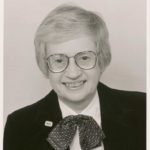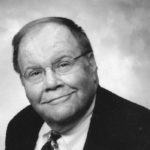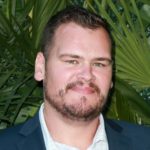Pride Month: Pioneers and Advocates for Mental Health
Happy Pride Month! June is LGBTQ+ Pride Month, which honors and celebrates the impact the LGBTQ+ community had made to society, as well as remember the obstacles the community has had to overcome, and continue to overcome, to ensure fair and equal rights for all.
Identifying as LGBTQ+ is not a mental illness or disorder. However, many members of the LGBTQ+ community experience mental health struggles linked to stigma, discrimination, and denial of their civil and human rights. At Compass Health, we stand with all members of the LGBTQ+ community, whether that be our staff or in the communities we serve.
Throughout the month on social media we’ll be highlighting LGBTQ+ trailblazers in the field of mental health, as well as LGBTQ+ public figures who use their platforms to highlight the importance of mental health care, specifically in the LGBTQ+ communities.
Kay Lahusen
The first pioneer we will be highlighting is Kay Lahusen! Lahusen was a professional photographer, writer, and gay rights activist. She played a crucial role in persuading the American Psychology Association (APA) to remove homosexuality from the list of mental disorders and documenting the historical movement against conversion therapy. Lahusen and her partner of 46 years, Barbara Gittings, were activists in the early LGBTQ+ rights movement. Both Lahusen and Gittings played a crucial role in founding the Gay Activists Alliance in 1970. Gittings worked with other gay activists and mental health advocates in the following years.
Association (APA) to remove homosexuality from the list of mental disorders and documenting the historical movement against conversion therapy. Lahusen and her partner of 46 years, Barbara Gittings, were activists in the early LGBTQ+ rights movement. Both Lahusen and Gittings played a crucial role in founding the Gay Activists Alliance in 1970. Gittings worked with other gay activists and mental health advocates in the following years.
Laverne Cox
The first mental health advocate we’re highlighting is Laverne Cox! Cox is an American actress and LGBTQ+ advocate. She rose to prominence with her role as Sophia Burset on the Netflix series Orange Is the New Black, becoming the first openly transgender individual to be nominated for an Emmy Award in any acting category and the first to be nominated for an Emmy Award since composer Angela Morley in 1990. Cox has helped her mental health by creating a balance in her busy schedule by establishing a fitness routine. Even though she stated that going to the gym isn’t her favorite pastime, she realized, “When I go to the gym, it becomes goal-oriented and not process-oriented. When I start thinking about the results, it’s not a good space for me to be in. I’m better when I focus on the journey.” She also stated that she needs to set time aside not only for her physical health but her mental health too. She supports her mental health by unplugging from the news and finding things that bring her joy, like a song or a person like her boyfriend when he makes her breakfast. Laverne has also been open about seeing a therapist to work through past traumas.
since composer Angela Morley in 1990. Cox has helped her mental health by creating a balance in her busy schedule by establishing a fitness routine. Even though she stated that going to the gym isn’t her favorite pastime, she realized, “When I go to the gym, it becomes goal-oriented and not process-oriented. When I start thinking about the results, it’s not a good space for me to be in. I’m better when I focus on the journey.” She also stated that she needs to set time aside not only for her physical health but her mental health too. She supports her mental health by unplugging from the news and finding things that bring her joy, like a song or a person like her boyfriend when he makes her breakfast. Laverne has also been open about seeing a therapist to work through past traumas.
Dr. John Fryer
The next pioneer we’re highlighting is Dr. John Fryer! Dr. Fryer was an American psychiatrist and gay rights activist best known for his anonymous speech at the 1972 American Psychiatric Association (APA) annual conference. He appeared in disguise and under the name of Dr. Henry Anonymous, where he spoke the following, “I am a homosexual. I am a psychiatrist.” During the APA conference in 1972, Dr. Fryer decided that a different perspective needed to be spoken from a gay psychiatrist to an audience that would potentially be more willing to listen to a fellow psychiatrist. Dr. Fryer experienced setbacks during his residency and professional career because of his sexuality. In 1973 the APA voted to declassify homosexuality as a mental health disorder.
annual conference. He appeared in disguise and under the name of Dr. Henry Anonymous, where he spoke the following, “I am a homosexual. I am a psychiatrist.” During the APA conference in 1972, Dr. Fryer decided that a different perspective needed to be spoken from a gay psychiatrist to an audience that would potentially be more willing to listen to a fellow psychiatrist. Dr. Fryer experienced setbacks during his residency and professional career because of his sexuality. In 1973 the APA voted to declassify homosexuality as a mental health disorder.
Ryan O’Callaghan
The last mental health advocate we’re highlighting is Ryan O’Callaghan!
O’Callaghan is a retired NFL player who identifies as LGBTQ+ and has battled mental health struggles throughout most of his life. When he realized that this professional football career was over due to a

lingering shoulder injury, O’Callaghan began abusing prescription pills to combat his mental health struggles. It only took NFL psychologist Dr. Susan Wilson a few sessions with O’Callaghan to realize that his struggles with substance abuse and suicidal ideation were not just because of his career-ending injury. After opening up to Dr. Wilson about his sexual orientation, she suggested to O’Callaghan that he fly home and be honest with his family and closest friends. After opening up to his friends and family, O’Callaghan realized that he was accepted with open arms leading to him realizing that his life was worth living.
O’Callaghan wrote an autobiography called My Life On The Line and started a foundation called the Ryan O’Callaghan Foundation (ROFDN) which provides scholarships, support, and mentorship for LGBTQ+ athletes at all levels.
While these two pioneers and two advocates come from different backgrounds and have had varying experiences, they were and are proud to stand up for the rights of the LGBTQ+ community. Their hard work continues to help pave the way for future generations.
Get In Touch
Compass Health is here to help. Whether you have questions about our services, want to share your feedback or a success story, have a media inquiry, or are seeking more information on a training or job opportunity, contact us today for assistance and support.